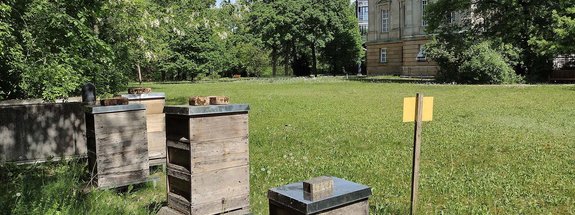Biodiversity in the garden of the German Supreme Court for tax law and customs and excise duties
The garden of the Federal Fiscal Court in Munich offers honey bees a home. Since 2018, beekeeper Ines Zirnbauer has been looking after several beehives on Ismaninger Straße. In doing so, the German Supreme Court for tax law and customs and excise duties contributes to preserve biodiversity in the city.
Wednesday, April 10, the spring sun shines on the lawn of the Federal Fiscal Court. Ines Zirnbauer presses both levers of the loppers tightly together. The branch on which a cluster of bees hangs falls into the moving box. "When the queen has landed in the box, the flying bees follow her." Ines Zirnbauer sweeps a few animals off her beekeeper's suit. "For us, such a swarm is harmless. But the bees are in mortal danger in the city because they can't find a new shelter."
A few days later, there's a fourth beehive in the garden of the Federal Fiscal Court. The bees now have a chance to survive. Many meadow flowers, shrubs and trees provide them with food. Until June, Ines Zirnbauer checks every one to two weeks how the bee colonies are developing. When the bees bring honey into the honey room, the beekeeper knows that they are doing well. Honey is harvested twice a year: in May and July.
Immediately afterwards, Ines Zirnbauer sets the colonies smaller. Breeding activity is declining significantly. Soon the first winter bees will hatch. They live for half a year and collect nectar from late-flowering trees. The beekeeper also treats the Federal Fiscal Court bees against the Varroa mite. The bees cannot protect themselves from these parasites. For hibernation, the bees join together in their beehives to form a winter cluster and warm their queen.
In the following March, about a quarter of the bees are still alive. From about 12°C onwards, the bees begin their cleaning flights. Ines Zirnbauer checks whether the queen and worker brood can be seen. The bee colonies are growing again.
"Intervene as little as possible in the way of life of the bees," says Ines Zirnbauer of her motto as a beekeeper. Honey bees are well cared for in the city. Thanks to such facilities as the garden of the Federal Fiscal Court.
Wild bees, on the other hand, need more protection. As ground nestlers, they lack habitat such as sandy soil. Especially in urban areas, the grounds are sealed. For this reason, the Federal Fiscal Court wants to use old and dead wood in the future in order for the garden to remain a diverse habitat.

